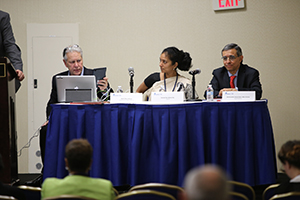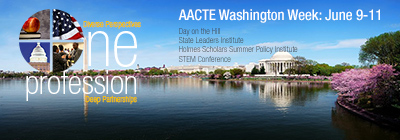21 Jul2015
By Kayla Campbell

AACTE will host two webinars this fall on integrating the Common Core State Standards (CCSS) in educator preparation programs, thanks to a grant from the Learning First Alliance’s Get It Right campaign. These 60-minute webinars will highlight AACTE members’ successes and challenges in aligning their programs with CCSS.
Following the recommendations of the National Association of State Boards of Education report Common Themes, Individual Approaches: Six States’ Experiences With New Science Standards, these webinars will focus on four key areas of CCSS implementation: communication strategy, community involvement, policy advancement and alignment, and professional development and capacity building.
13 Jul2015
By Angela Maynard Sewall
Beginning this fall, AACTE will host a series of four free webinars on preparing effective principals through collaborations among higher education institutions and school districts.
The webinars will feature participants in the Wallace Foundation’s Principal Pipeline Initiative, a multiyear effort to strengthen the preparation and support of principals in six high-need urban districts: Prince George’s County (MD), Charlotte-Mecklenburg (NC), Denver (CO), New York City, Hillsborough County (FL), and Gwinnett County (GA).
The initiative, for which AACTE has served as a communications partner, builds on over a decade of research that identified four key parts of a pipeline to develop successful principals: rigorous job requirements, high-quality preparation, selective hiring, and on-the-job evaluation and support.
06 Jul2015
By Evelyn Perry
I want to congratulate the organizers of the recent Mid-Atlantic edTPA Implementation Conference at Towson University (MD) for doing something that should be standard at educator preparation conferences: They included PK-12 partners in the conversation and created a high-profile opportunity for them to tell their stories. To accomplish this goal, the National Education Association worked with conference organizers to set up a panel discussion, inviting teacher candidates and teachers to participate and asking me to facilitate.
The conversation at the conference provided authentic educator perspectives on recent experiences with edTPA. Here are my five top takeaways from the conversation.
29 Jun2015
By Diana Lys
I recently had the pleasure and honor of delivering the keynote address for the 2015 edTPA Mid-Atlantic Implementation Conference in Towson, Maryland. As a longtime supporter and champion of observation- and performance-based educator preparation and assessment, I was eager to share with peers from across the nation who are at different places on their journey with edTPA.
First, I wanted to commend each person for being there. By the virtue of their attendance and leadership, participants were helping shift the negative tone of dialogue around teacher preparation by highlighting innovative practices and committing to positive change. At the core of the narrative is a shared rallying call to ensure each teacher candidate enters tomorrow’s classroom ready to teach.
23 Jun2015
By Shaneé Wangia and DeShawn Sims
A double narrative dominates contemporary discussions of teacher quality, leading to often-contradictory policies that stymie reform efforts. First is the democratic imperative to provide equitable access to a quality education to all students, which calls for broadening the diversity of the teaching force to better reflect student demographics. Second is the push for tightening quality controls such as GPA and testing requirements in teacher preparation programs, which results in a considerably less diverse teaching pool. AACTE Holmes Scholars learned about this paradox firsthand earlier this month during Washington Week as they explored the themes of diversity, equity, access, and accountability with a variety of guest speakers from national organizations.
23 Jun2015
By Winnie Looby and Terrance McNeil
During AACTE’s 2015 Washington Week, we were among a dozen AACTE Holmes Scholars® attending a 3-day Summer Policy Institute that promoted mentorship and support while introducing participants to the national education policy scene. In addition to meeting with policy makers and leaders of various educational organizations, Scholars engaged in a site visit June 9 to the U.S. Department of Education.
17 Jun2015
By Lucy Berrier
Nominations for all of the 2016 AACTE awards are now open on AACTE’s online submission site. To read detailed submission information, please refer to the official Call for Entries.
Now in its 20th year, AACTE’s awards program recognizes member institutions’ exemplary programs as well as individuals who have made noteworthy contributions to education preparation.
16 Jun2015
By Michelle Kotek
AACTE’s Washington Week kicked off with diverse perspectives, enlightening anecdotes, and compelling conversations at the special conference “Progress and Factors That Contribute to Closing the STEM Achievement Gap,” sponsored by the National Science Foundation. Five presenters joined AACTE leaders on two panels discussing ways to improve learning outcomes of underrepresented populations in the STEM fields.

Hall Davidson, Vasanta Akondy, and Armando Sanchez-Martinez at STEM Conference
The conference began with presenters Armando Sanchez-Martinez, manager of Editorial Santillana in Mexico, and Vasanta Akondy, co-manager of the Verizon Innovative Learning Program (VILP), who together provided a global perspective on innovative solutions to increase access to STEM education in Mexico and India.
Sanchez-Martinez presented a comprehensive look into Mexico’s educational landscape, including a detailed explanation of sociocultural factors that contribute to local achievement gaps and of the current educational movements and solutions to closing the gap. Akondy highlighted the importance of VILP and its efforts to recruit more girls in India into the STEM fields. The aim of this program is to provide a community network of support while focusing on student engagement and providing technological resources to underfunded schools.
16 Jun2015
By Kayla Campbell
More than 100 teacher educators, students, and partners convened in Washington, DC, last week for AACTE’s Day on the Hill, bringing the voice of the profession to members of Congress. The event was held June 10-11 as part of AACTE’s Washington Week.
Day on the Hill began with a half-day orientation that explored participants’ role in advocating and advancing the profession. To prepare attendees for engaging with members of Congress and their staff, the afternoon started with an update on education-related activity on Capitol Hill from Deborah Koolbeck, AACTE’s director of government relations. Koolbeck also reviewed talking points provided by AACTE and discussed strategies for choosing the most effective talking points to use in various meetings with policy makers.
16 Jun2015
By Jerrica Thurman

Throughout AACTE’s Washington Week, June 9-11, the theme “Diverse Perspectives, Deep Partnerships, One Profession” permeated each event, motivating attendees to forge and nurture bonds that will strengthen the profession. From the emerging leaders attending the Holmes Scholars Summer Policy Institute to the chapter executives at the State Leaders Institute, and from the STEM conference through Day on the Hill, participants connected with peers, policy makers, and partners around common goals and interests.
16 Jun2015
By Kate DaBoll-Lavoie
AACTE just hosted another great Washington Week! This was my third year attending the State Leaders Institute (SLI), and I’m always amazed at how much I learn about what is happening at the federal level and in other states, how other state associations are supporting teacher and leader preparation that will positively affect student learning, and how they are facing and addressing the challenges that are impacting our profession.
All regions of the country were represented during the June 9-10 institute, and as stories were shared, I believe we came to deeper understanding about the uniqueness of our respective states—and, perhaps more importantly, about the ways we are similar and how those similarities can help us frame a common message.
09 Jun2015
By Jerrica Thurman
Today, AACTE’s Washington Week kicks off with a full lineup of interactive sessions, discussions, and advocacy around educator preparation. In addition to our traditional advocacy-focused events, we are hosting a special conference this afternoon on closing the student achievement gap in the critical subjects of science, technology, engineering, and mathematics (STEM).
Funded by a grant from the National Science Foundation, today’s conference will feature a multidisciplinary group of education researchers, practitioners, and scientists who will share their theoretical approaches and successful models for promoting the STEM achievement. The panelists will also discuss how to build collaborative, interdisciplinary partnerships for addressing the U.S. achievement gap in STEM subjects—drawing on international lessons—as well as ways to improve learning outcomes of underrepresented populations in the STEM fields.
02 Jun2015
By Tim Finklea

On May 26, the College of Education at William Paterson University (NJ) brought together university, school, and community members for a very special event organized by Candace Burns, dean of the college, and Sharon Leathers, director of educational innovations and grant initiatives. I was privileged to participate along with my colleague Rodrick Lucero, AACTE’s vice president for member engagement and support.
The event centered on the award-winning documentary American Promise, which follows two African American boys through 13 years of schooling in a unique coming-of-age film. Around the country, internationally, and through the PBS network, this amazing film has provoked new conversations and raised difficult questions about what the promise of education means in America, particularly for children of color.
02 Jun2015
By Scott Morrison, Jeff Carpenter and Michael Maher
Despite common caricatures of Twitter as the domain of callow teens and celebrity stalkers, it is a technology that should be taken seriously by teacher educators. Although social media has had a dramatic impact on communication in the modern world, the field of teacher preparation has been largely reluctant to add its voices to the mix. It is high time that we wake up to the role new media can play in our professional lives—and to the risks of remaining on the sidelines.
We have seen what can happen when we allow others to decide how our story is told, especially those who view our work with suspicion or even outright hostility. When U.S. Secretary of Education Arne Duncan said that “many if not most of the nation’s 1,450 schools, colleges, and departments of education are doing a mediocre job of preparing teachers for the realities of the 21st-century classroom,” for example, that message won broad circulation, including in social media. Today, the secretary’s and the U.S. Department of Education’s Twitter accounts reach more than 500,000 individuals. By comparison, AACTE’s Twitter account has approximately 5,600 followers.
19 May2015
By Kyle Shanton

Last year, an AACTE State Chapter Support Grant enabled members of the Michigan Association of Colleges for Teacher Education (MACTE) to build more collaborative relationships with PK-12 schools and the Michigan Department of Education in order to facilitate more meaningful and relevant discussion on the preparation of excellent beginning teachers. This work supported the chapter’s goal of “promoting, within Michigan, the learning of all PK-12 students through the promotion of high-quality preparation and continuing education for all school personnel.”
Many thanks to AACTE, we were able to host a summer workshop at Ferris State University, the primary accomplishment of which was the review and revision of the MACTE Strategic Plan that had been developed the previous year. Based on input from the workshop, the group decided to tailor the annual conference to provide a forum for examining and highlighting the increasingly pressing issue of beginning teacher evaluation and distinctive efforts to improve educator preparation.











